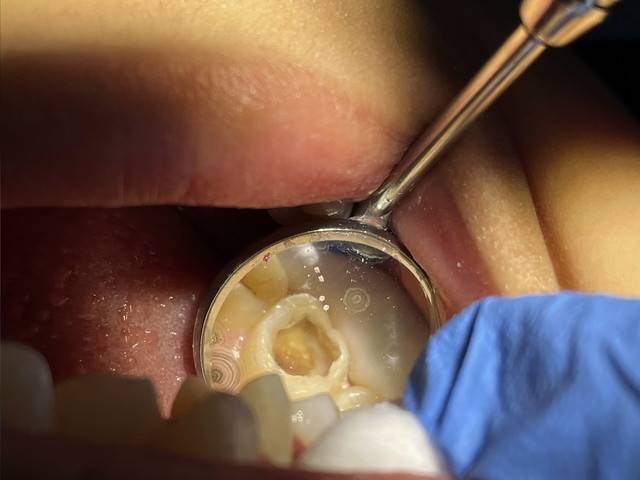Street children without access to healthcare suffer from distressing dental issues
Street children are entitled to the same rights as other Malaysian citizens. Unfortunately, due to their parents' reluctance to register their births, these children are deprived of essential services, including access to government health services and other facilities.

KUALA LUMPUR - In a shocking turn of events, a group of dentists providing free treatments for the homeless and urban poor were taken aback when a four-year-old boy appeared to seek dental services at the back alley of Jalan Tuanku Abdul Rahman.
The sight of the four-year-old's dental condition was distressing, as the majority of his baby teeth had been reduced to stumps, and more than 10 teeth faced irreversible cavity problems, leaving no viable option for saving them.
As a final intervention, the dentist had to extract all of the boy's milk teeth to prevent severe inflammation of the gums or tooth roots, averting potential complications such as swelling, suppuration, and susceptibility to various diseases.
"This boy is suffering from severe early childhood caries which requires all his teeth to be extracted earlier than they should be. Each baby tooth will fall in its own time before permanent tooth growth. For example, front teeth fall between the ages of six and seven, depending on the tooth structure.
"When they have to be extracted as early as two or three years before the growth of permanent teeth, these children will find it difficult to eat, resulting in disrupted growth due to lack of proper nutrition," explained Dr. Muhammad Nazmi Abdul Majid to Bernama.
The sad reality is that the boy's plight is shared by most of the street children around Chow Kit, Lorong Haji Taib, and Kampung Baru who turned up for free dental treatment.
Dr. Muhammad Nazmi, the secretary of the Dentistry For The Needy (DFTN @ Chow Kit) programme and Hospital USM Dental Public Health Specialist trainee lecturer, expressed deep concern over the alarming situation.
He emphasised that such critical dental issues should not be occurring in a central city location equipped with dental treatment service facilities.
"DFTN provides free dental treatment to this community on the last Thursday of every month. We find that between five and eight of these street children need to have all their teeth extracted much earlier, and the numbers are shocking.
"This situation is not happening in rural areas with limited access to free dental treatment. We discovered that one of the contributing factors preventing parents from seeking free dental treatment for street children at government clinics is the absence of identity documents.
It is also compounded by a lack of awareness regarding oral health care " he said.
The DFTN programme has been spearheaded by the Islamic Dental Association of Malaysia for the past six years.
Dr. Muhammad Nazmi said the lack of identification documents denies these street children the right to access dental treatment at government health facilities at subsidised prices.
"This situation causes the urban poor and homeless communities to prioritise food over health and dental care. We found that the street children's poor dental health stems from the type of food they eat.
"Their parents are unable to provide nutritious food and most of them just eat what gives them some energy, such as unhealthy snacks and sweet stuff, which increases the risk of tooth decay," said DFTN vice chairman Dr. Bryan Sasikaran.
While some may perceive it as just a dental issue that does not require serious attention, tooth decay should not be underestimated.
It not only hampers a person's productivity but also presents a potentially life-threatening risk when swelling and pus affect the respiratory tract. Unfortunately, incidents of such severity have been reported among street children in impoverished countries.
"There are many nerves, blood vessels, and cavities near vital body parts, such as the respiratory tract, so it is crucial to address dental problems seriously. We hope the government will take proactive measures to help street children access necessary health services.
"We have also heard about these children excelling in their studies. It is such a waste when the nation's successors are denied various rights just because they do not have citizenship documents," he said.
Due to challenges faced by the homeless and urban poor without identification documents, DFTN has taken proactive steps to provide dental care directly in the community while also increasing awareness about oral health.
Dr Bryan mentioned that among the treatments offered are extractions, fillings, and preventive treatment by applying fluoride gel to prevent cavities.
"We also distribute toothbrushes and toothpaste and instruct them on oral hygiene procedures such as brushing their teeth in the right way, as well as offer free blood pressure and blood sugar tests," he added.
Dr. Bryan, who is also a resident dentist at Klinik Pergigian Rayyan Rafeeqi in Pajam, Nilai said that a total of 10 to 20 children turn up every month for dental checks and various treatments.
"Most of them were afraid to see us in the early days. So we carried out various icebreakers to make them comfortable. Now more people are coming in for dental check-ups and even their oral hygiene level is improving," he commented. - BERNAMA
Download Sinar Daily application.Click Here!














